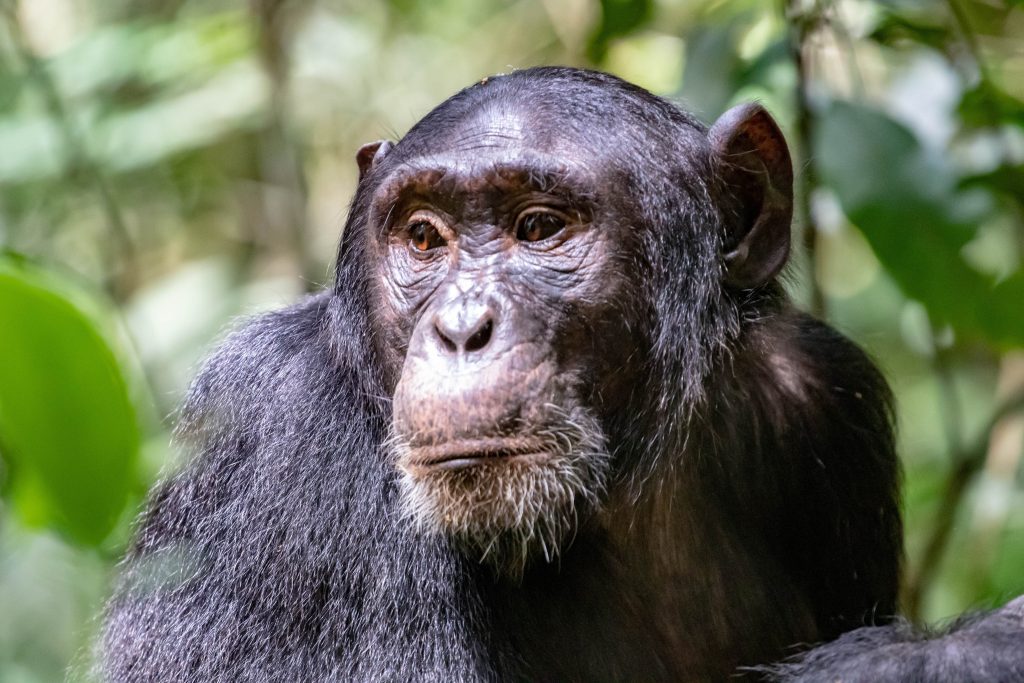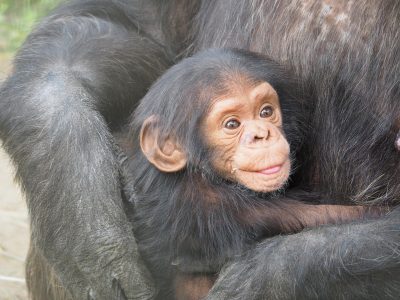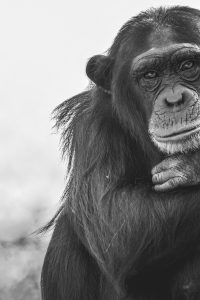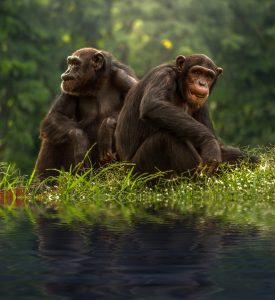The Complex Lives of Chimpanzees
By Evelyn Morris
11 July 2024
“The more I came to learn about chimpanzees the more I came to realize how like us they are… Finally we realize we are a part of the animal kingdom not separate from it.”
– Dr. Jane Goodall, DBE Founder, the Jane Goodall Institute & UN Messenger of Peace
 I’m sure you have seen those viral videos of chimpanzees on social media platforms. Many videos show chimps using tools, playing in groups, or even throwing food tantrums, mostly in captivity.
I’m sure you have seen those viral videos of chimpanzees on social media platforms. Many videos show chimps using tools, playing in groups, or even throwing food tantrums, mostly in captivity.
While they might look like they are having fun, many are staged, and often the animals portrayed are far from happy. As if being kept in captivity isn’t enough, these animals are actually highly intelligent, capable of communication, problem solving and even empathy. Research has shown they live in complex social structures, not unlike those we humans do.
Facts about Chimpanzees
We share between 92 and 98% of our DNA with chimpanzees who are often referred to as our closest primate cousins. Our two species descended from a single species that lived millions of years ago.
Here are some other interesting facts about chimpanzees…
Very Important Role
Chimpanzee along with the other great apes and elephants play a crucial role in the maintenance of biodiversity in Central Africa’s forests. The large seeds they eat and disperse are too big for most other animals. Without them, and their fellow great apes and elephants, these forests would be irreversibly changed.
Not a Bonobo
The bonobo, the chimpanzee’s closest ape relative is often called the pygmy chimpanzee. However they are different animals, although between them, they are the only species in the genus Pan, a sister taxon to the human lineage, thus the closest living living relatives to humans.
An interesting facts about bonobos that can help to distinguish them from chimpanzee is that they are far less afraid of water than chimps, and often will fish for shrimp by hand.
Only in Africa
While there are many chimpanzee living in captivity, wild chimpanzees are only to be found in Africa. The largest concentration of Chimpanzees are mostly in rainforest areas in central Africa. The fruits chimps eat need the abundant water supply of these areas. Sadly, many of these regions are being encroached on by human settlements or destroyed due to mining or commercial farming efforts.
Omnivores, just like us!
Chimpanzees enjoy a diverse menu that includes both plants and animals. Fruits, nuts, leaves, and even fungi are all fair game. They’ll readily devour flowers, insects, and even small meat sources. Chimpanzees are resourceful eaters, too. They chew on fruits to make handy “wadges” which are then dipped in water to get to the delicious juices. However, their diet isn’t limited to what they can find with their bare hands.
Toolmakers
Chimpanzees are known for their impressive tool use. Cracking tough nuts becomes a breeze with a stone acting as a hammer and a branch as an anvil. The nut is placed on a sturdy surface like a tree root, then smashed open with their makeshift tools. Their ingenuity extends to insect hunting as well. Chimps can modify sticks to the perfect length, creating an “ant rod” that they dip into ant nests. The ants climb up the stick, becoming a tasty snack for the clever chimp.
They can live into their 80s
The oldest recorded chimpanzee in captivity, Little Mama, died in 2017. She was estimated to be 82 years old. The life expectancy for captive chimps is around 38 years. it is difficult to record their lifespan in the wild, but researchers in Uganda have measured an average life expectancy of 33 years.
4 Subtypes
There are four subtypes of chimpanzees with researchers coming close to identifying a fifth.
These are:
- The central chimpanzee or the tschego (Pan troglodytes troglodytes) are mostly from Central Africa, mostly in Gabon, Cameroon, Republic of Congo and the Democratic Republic of Congo.
- Western chimpanzee (P. troglodytes verus) found in Ivory Coast, Guinea, Liberia, Mali, Sierra Leone, Guinea-Bissau, Senegal, and Ghana with about 52,800 individuals still in existence.
- Nigeria-Cameroon chimpanzee (P. troglodytes ellioti; also known as P. t. vellerosus) live within forested areas across Nigeria and Cameroon, with 6000–9000 individuals still in existence.
- Eastern chimpanzee (P. troglodytes schweinfurthii) are found in the Central African Republic, South Sudan, the Democratic Republic of the Congo, Uganda, Rwanda, Burundi, Tanzania, and Zambia, with approximately 180,000–256,000 individuals still existing in the wild.
World Chimpanzee Day
Every year, in an attempt to honour human’s closest cousin in the animal kingdom we celebrate World Chimpanzee Day on July 14. It was on this day, in 1960 when Dr Jane Goodall, first arrived in what is today known as Gombe Stream National Park, to begin her study of wild chimpanzees.
Goodall, along with dedicated researchers who followed her path revolutionised our understanding of chimpanzees. We now recognize the remarkable similarities between us, from crafting and using tools to complex communication and even acts of selflessness. This growing knowledge strengthens the bond we share and underscores our critical role in safeguarding these intelligent and intricate creatures.
World Chimpanzee Day isn’t just about celebrating these fascinating creatures, it’s also a crucial reminder of the challenges they face. The International Union for Conservation of Nature (IUCN) classifies all four chimpanzee subspecies as endangered. The IUCN cites deforestation, poaching for the pet trade, and infectious diseases as the biggest threats.
The Wildlife Conservation Society (WCS) has cited the Chimpanzee’s slow rate of reproduction as a factors in their declining numbers. It takes 14-15 years to replace a killed adult as a breeding individual. Chimpanzees also face over 140 human diseases.
What can you do?
You too can help chimpanzees on World Chimpanzee Day and any other day of the year. Here are some things you could do:
- Sharing about World Chimpanzee Day on social media using hashtag #WorldChimpanzeeDay
- Host an event or opportunity for your friends to learn more about chimpanzees. Ask them to share about it on their own social media platforms
- Positive consumer behaviour such as cell phone recycling and avoiding products with unsustainable palm oil helps chimpanzees by helping to protect their habitats
Has this newsletter inspired you to visit Africa to see chimpanzees in the wild? Contact our reservations department to find out about booking a trip including a chimpanzee trek in Uganda or Rwanda.
Contact
Somak House
Harrovian Business Village
Bessborough Road
Harrow On the Hill
HA1 3EX
Tel: +44 20 8423 3000
Fax: +44 20 8423 7700
Email: info@somak.com
Opening times
| Mon - Fri | : | 9am to 6pm |
| Sat - Sun | : | Closed |







